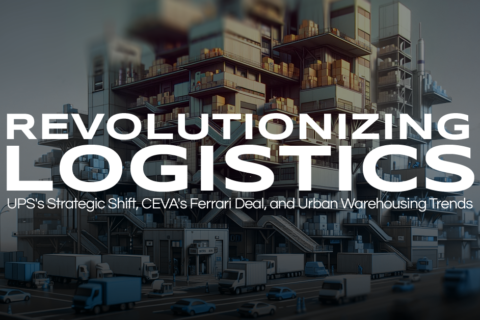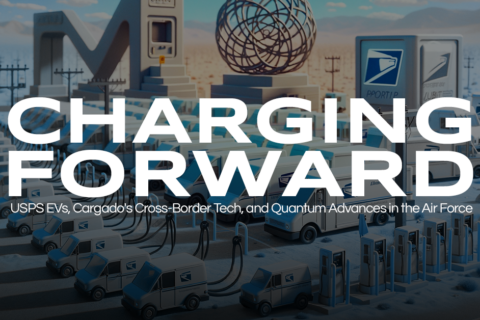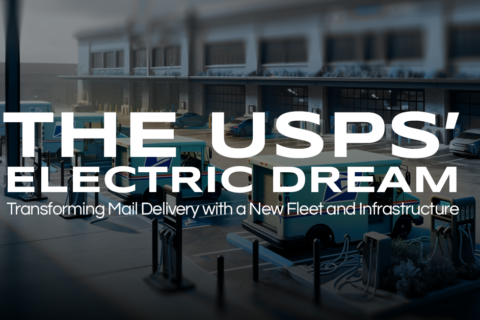Welcome to your weekly recap, shining a light on pivotal moments and ventures within the trucking and logistics arena. This collection of stories unfolds a narrative of change, innovation, and resilience, showcasing how key players are steering through challenges and seizing opportunities for growth. From UPS’s strategic pivot with Coyote Logistics to CEVA Logistics renewing ties with Scuderia Ferrari, and the innovative leap towards multi-story warehouses, these tales are set to redefine industry standards. Join us as we navigate through these developments, offering insights into the evolving dynamics of the logistics world. Strategic Shifts Ahead for UPS UPS Inc. is taking decisive action to navigate its current financial landscape, announcing its intention to assess strategic options for Coyote Logistics, potentially leading to a sale. This move is part of a broader initiative dubbed “Fit to Serve,” aiming to streamline operations and enhance efficiency. Acquired for $1.8 billion in 2015, Coyote Logistics has not performed as expected, struggling with the cyclical nature of the freight brokerage industry, a challenge UPS CEO Carol Tomé acknowledged. Navigating Cyclical Challenges The freight brokerage sector is known for its fluctuations, and Coyote has been no exception. Initially generating about $2 billion annually, its revenues soared during the pandemic, only to decline significantly in the aftermath. This volatility, combined with a downturn in demand and collapsing rates, has led to multiple layoffs within Coyote since the beginning of 2023. UPS’s decision reflects a strategic pivot similar to the sale of its UPS Freight division, signaling a move away from cyclical businesses that do not align with its core network vision. A Broader Cost-Cutting Strategy As part of its “Fit to Serve” initiative, UPS also plans to eliminate 12,000 management and contract jobs, less than 3% of its workforce, aiming for approximately $1 billion in savings for 2024. These layoffs, primarily occurring in the first half of the year, are a significant aspect of UPS’s strategy to adapt to a new operational model, even as market conditions improve. This approach is in response to a challenging macroeconomic environment, higher labor costs, and the need for operational efficiency. Looking Ahead with Caution and Optimism Despite a tough year marked by a 9.3% revenue drop and a 28.7% decrease in adjusted operating profit, UPS is cautiously optimistic about stabilizing revenues and margins through 2024. With projected revenue of $92 to $94.5 billion and adjusted operating margins between 10% and 10.6%, the company is focused on recovery and growth. The recent improvement in quarterly results, particularly in U.S. daily volumes, signals a rebound in business, driven by regained volumes and seasonal peaks. 🔗 Learn more about UPS’s strategic reevaluation and cost-cutting measures here. A Winning Partnership Extended CEVA Logistics, a subsidiary of the CMA CGM Group, has reignited its commitment to Scuderia Ferrari by renewing a multi-year agreement as the official logistics partner. This partnership, which stretches from the Formula 1 Grand Prix to the GT races and Ferrari Challenge events, is a testament to the mutual trust and shared vision for excellence between the two iconic brands. As Scuderia Ferrari gears up to unveil its 2024 single-seater, CEVA’s logo will once again adorn the team’s vehicles and equipment, spotlighting the logistics giant’s pivotal role in Ferrari’s racing success. Driving Innovation and Sustainability The collaboration between CEVA Logistics and Scuderia Ferrari is more than just about speed and efficiency; it’s a shared journey towards innovation and sustainability. CEVA has been instrumental in ensuring Scuderia Ferrari’s equipment reaches global destinations timely, showcasing agility and expertise in global logistics. With the 2024 Formula 1 World Championship on the horizon, featuring 24 events worldwide, CEVA’s logistical prowess will be crucial in maintaining the smooth execution of Ferrari’s racing calendar. Commitment to a Greener Future Both CEVA Logistics and Scuderia Ferrari are steering towards a more sustainable future, with ambitious decarbonization goals. CEVA’s commitment to achieving Net Zero Carbon by 2050 aligns with Ferrari’s passion for innovation and environmental stewardship. Through initiatives like the pioneering rail transport service that significantly reduces carbon emissions, CEVA is setting new standards in eco-friendly logistics, contributing to Formula 1’s sustainability efforts. A Partnership Powered by Passion and Precision The extension of this partnership is a clear indicator of CEVA’s and Ferrari’s aligned ambitions to excel and innovate. Olivier Storch, Deputy CEO of CEVA Logistics, and Lorenzo Giorgetti, Chief Racing Revenue Officer at Ferrari, both emphasize the importance of continuous improvement, sustainable solutions, and the passion that drives their success. As the Formula 1 calendar expands and the logistical challenges mount, the collaboration between CEVA and Ferrari showcases a commitment to overcoming barriers and achieving excellence, all while respecting the planet. 🔗 Explore the dynamic partnership between CEVA Logistics and Scuderia Ferrari here. The Sky’s the Limit for Warehouse Development The logistics landscape is undergoing a remarkable transformation as the demand for warehouse space in dense urban areas skyrockets. Developers and construction firms are pushing the boundaries of traditional warehouse designs, opting for larger floorplates and taller clear heights to cater to the growing needs of e-commerce giants and third-party logistics firms. This shift towards multi-story facilities is a creative response to the challenge of land scarcity in urban centers, offering a new paradigm in warehouse construction and operation. Building Upwards in a Land-Scarce World Urbanization has significantly limited the availability of large parcels of land for new warehouses, presenting a major challenge for logistics operations. The solution? Building upwards. Multi-story warehouses, once a novel concept, are becoming increasingly viable thanks to advancements in technology, adaptive construction techniques, and innovative operational strategies. However, the adoption of these complex layouts is still in the early stages, with many industry players awaiting further proof of concept before fully committing. Navigating New Heights and Challenges Multi-story warehouses offer several advantages, including maximizing rentable area on expensive land plots and reducing transportation costs through closer proximity to urban centers. Yet, these benefits come with a set of unique challenges, such as higher construction costs, longer timelines, and the complexity of leasing upper…











Recent Comments